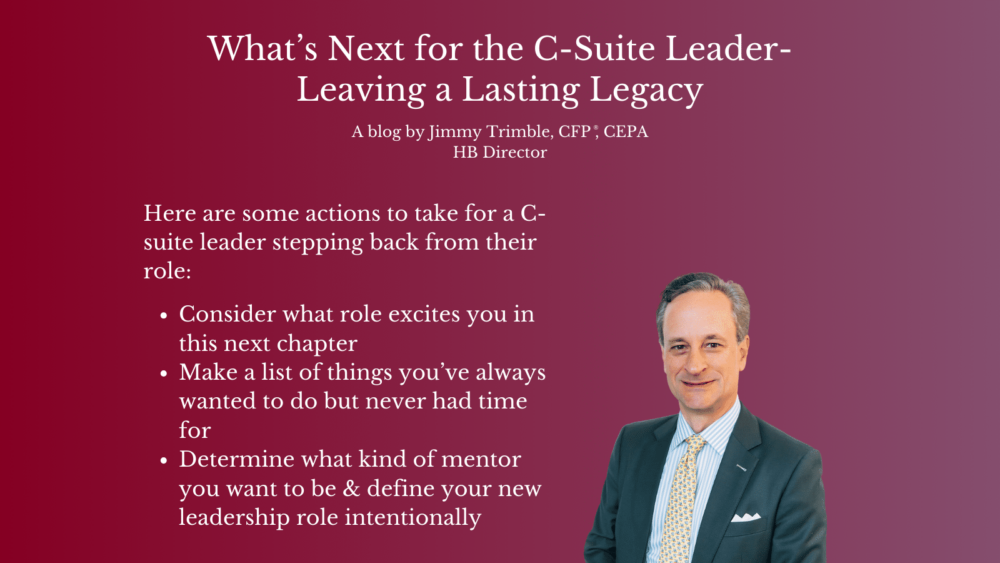“You don’t retire from being a leader—you evolve into a different kind of one.”
For many C-Suite leaders, the company isn’t just a job or an asset—it’s a reflection of who they are. It’s the product of years of risk-taking, long nights, and personal sacrifice.
So, what happens when it’s time to step back?
Succession plans may transition the company to the next generation of leaders, but they don’t address the real emotional challenge: How do you transition from your role as CEO or C-Suite Executive without losing your sense of identity?
We believe that the most successful leaders don’t let go of their purpose; they redefine it. Here’s how.
From the C-Suite to Legacy Leader: A New Chapter in Leadership
Stepping away from the daily operations of a business doesn’t mean stepping away from leadership. In fact, the most respected business founders become advisors, mentors, and legacy-builders long after they hand over the reins.
What does a legacy leader role look like?
- Providing guidance without micromanaging
- Acting as a stabilizing force in times of change
- Using wisdom and networks to open doors for the next generation
Example: After leading PepsiCo for over a decade, Indra Nooyi transitioned into an advisory role, mentoring young leaders and advising on the company’s strategic vision. She also wrote “My Life in Full,” sharing her leadership journey to inspire the next generation.
| Your move: Consider what role excites you in this next chapter—advisor, mentor, board member, or even a thought leader in your industry. |
Separating Business from Self-Worth: You Are More Than Your Company
For decades, your title, decisions, and successes have been central to your identity. So, when that structure shifts, it can feel unsettling.
Many business owners struggle with questions like:
- “Without my company, who am I?”
- “Where will I find purpose outside of work?”
- “How do I stay relevant in my industry?”
Reframing Your Purpose
- Look at Your Legacy Holistically: Your impact is bigger than the business—it’s the relationships you’ve built, the people you’ve mentored, and the values you’ve instilled.
- Find New Challenges: Many entrepreneurs find fulfillment in philanthropy, angel investing, or coaching future leaders.
- Revisit Personal Passions: Hobbies, travel, and creative pursuits often take a backseat during years of intense business-building. This is the time to rediscover them.
Example: Some founders transition into teaching, serving on nonprofit boards, or writing books to share their insights. Their influence grows beyond the business itself.
| Your move: Make a list of five things you’ve always wanted to do but never had time for. Now’s your chance. |
The Role of Mentorship: Staying Engaged Without Holding on Too Tightly
One of the biggest challenges in succession planning isn’t the logistics—it’s the leader’s ability to step back without hovering.
It’s a delicate balance:
Too involved → The successor feels micromanaged and lacks confidence.
Too absent → The team loses institutional knowledge and wisdom.
How to Mentor Without Managing
- Set clear boundaries—offer advice but let them make decisions.
- Be a sounding board, not a problem-solver.
- Trust that mistakes are part of leadership growth—you made them too.
Example: Some executives create structured mentorship roles where they meet with successors periodically instead of staying involved in daily operations. This allows for continuity without overreach.
| Your move: Ask yourself—what kind of mentor do you want to be? The guide in the background or the coach on the sidelines? Define your new leadership role intentionally. |
Final Thought: The Best Leaders Leave a Legacy
Your legacy-oriented leaders, their role as an executive was never just about business success, it was about creating something lasting.
Ask yourself:
- What impact do I want to have beyond the company?
- How can I share my wisdom in a way that outlives my tenure?
- Who do I want to help grow into the next great leader?
True leadership doesn’t end when you step back, it evolves into something even more meaningful.
Because a legacy isn’t just what you leave behind; it’s what you set in motion.
To learn more or get help with your life experiences, please call 404.264.1400 or email us at info@hbwealth.com.
Important Disclosures
This article may not be copied, reproduced, or distributed without Homrich Berg’s prior written consent.
All information is as of date above unless otherwise disclosed. The information is provided for informational purposes only and should not be considered a recommendation to purchase or sell any financial instrument, product or service sponsored by Homrich Berg or its affiliates or agents. The information does not represent legal, tax, accounting, or investment advice; recipients should consult their respective advisors regarding such matters. This material may not be suitable for all investors. Neither Homrich Berg, nor any affiliates, make any representation or warranty as to the accuracy or merit of this analysis for individual use. Information contained herein has been obtained from sources believed to be reliable but are not guaranteed. Investors are advised to consult with their investment professional about their specific financial needs and goals before making any investment decision.
©2025 Homrich Berg.













Did Anything Change During The Government Shutdown?
Last month, we talked about the potential data vacuum of no inflation or jobs reports…
Read More